
A great white shark.
HYANNIS – The annual return of the white sharks, a growing heroin epidemic and the winter of discontent were among the stories that created major news headlines in 2015 on Cape Cod.
It was also the beginning of a new era for a local Native American tribe, the beginning of the end for a controversial nuclear power plant and the continued losing battle over coastal erosion that captured our attention.
From the beginning of 2015 to the waning days of December, it’s been another 12 months of non-stop news in Barnstable County. Here are some of the top stories you read on CapeCod.com and heard on our CCB Media radio stations.
A Growing Heroin and Opiate Crisis:
Cape Cod was not unique in experiencing the scourge of an exploding epidemic of heroin and opiate abuse and overdoses, but the constant flow of stories about major drug busts and drug-related deaths was unrelenting.
Health officials say the number of U.S. heroin user has grown by about 300,000 over a decade. Most of the increase was in whites, across income levels.
Experts think the increase was driven by people switching from opioid painkillers to cheaper heroin.
Governor Charlie Baker released the recommendations of his own 18-person task force on substance abuse in June.

The HBO Documentary Film’s poster sits in the Tilden Arts Center lobby at the Cape Cod Premiere
On Cape Cod, local, county and state officials continued looking for ways to stem the epidemic, with a focus on education and awareness about the dangers of drug abuse.
State Senator Vinny deMacedo (R-Plymouth) gave his inaugural address to the Senate in January, focusing heavily on the epidemic.
“We’ve done more than we’ve ever done in the history of the Commonwealth of Massachusetts in addressing substance abuse and treatment,” deMacedo said of recent legislative efforts. “What I have seen over the last three years has just literally shocked me. Every day, I run in to somebody new who tells me a brother or a sister or a friend or a cousin has been taken in by this epidemic of addiction to heroin.”
In late 2015, HBO aired a documentary chronicling the lived of eight Cape Cod young people addicted to heroin and opiates, two of whom died of overdoses before the program even aired.
In response to the increase in deaths from overdoses statewide, the Barnstable County Regional Substance Abuse Council approved a $600,000 action plan in 2015 that targets addiction.
Funding for the project will come from state grants, and Barnstable County Human Services Director Beth Albert said the plan will hone-in on prevention, intervention, treatment and recovery.
The approval comes on the heels of Governor Charlie Baker’s Opiate Addiction Working Group, which has sunk $27 million into prevention education in schools, treatment beds, recovery centers and prescription monitoring programs.
Still, the state Department of Public Health’s current estimates suggest opiate overdose deaths are on the rise, as much as 15% from 2013.
The Sharks Returned to Cape Cod
In what has become an annual rite of passage each summer, dozens of white sharks returned to the shores off Monomoy and the Outer Cape in 2015, creating more fascination for locals and visitors, and unprecedented research opportunities for scientists.
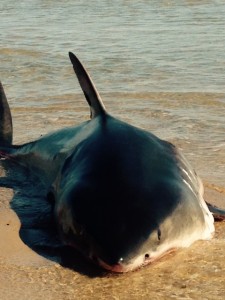
PHOTO COURTESY: Wellfleet Police Department
Shark biologists Gregory Skomal and John Chisholm from the Massachusetts Division of Marine Fisheries began year two of a five-year population study of great white sharks with the help of a relatively new nonprofit the Atlantic White Shark Conservancy, which is funding the work.
Cynthia Wigren, co-founder and president of the Atlantic White Shark Conservancy, said the researchers began seeing more great white sharks earlier in the season this year than last year.
“It’s been a very active and busy start to the season so we’ve been excited about how much activity there’s been compared to last year at this time,” she said in August.
The great white shark season off Cape Cod lasts from about May through the fall.
“We know from receivers in the water that they are leaving the area around December,” Wigren said.
But last year, the shark sighting season for the researchers did not really pick up until August, Wigren said. By the time the research was completed in October, researchers had recorded 68 sharks.
In contrast, this year the researchers started seeing multiple sharks in the water in July and a lot of those sharks have been “new” sharks, meaning they were not identified and catalogued among the 68 that were viewed last year.
The summer of 2015 also delivered two unique and rare shark strandings on Cape Cod, with one in Chatham and the other in Wellfleet. The animal that stranded in Chatham survived, but the shark that came ashore in Wellfleet did not. A necropsy was performed on the Chatham Fish Pier.
The Winter of Discontent
We were just a few weeks into 2015 and experiencing a somewhat mild winter when our good luck came to a crashing end with a major blizzard. The late January storm was measured in feet, not inches, and paralyzed Cape Cod. Some residents were trapped in their homes as many neighborhoods went unplowed for days.
Large sections of main roads were cut off by drifting snow. Route 28 by the Barnstable Municipal Airport was completely impassable, with even the largest plow trucks unable to clear the mess. Front end loaders were brought in after the storm ended to re-open the road.
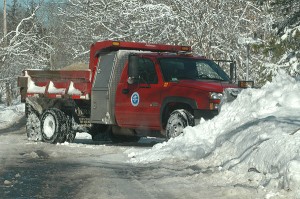 The state’s congressional delegation urged President Barack Obama to accept Gov. Charlie Baker’s request that the federal government extend its disaster aid coverage for the late January blizzard from 48 to 72 hours.
The state’s congressional delegation urged President Barack Obama to accept Gov. Charlie Baker’s request that the federal government extend its disaster aid coverage for the late January blizzard from 48 to 72 hours.
In a letter to Obama, the delegation said the 48-hour period approved in late April wasn’t adequate.
And it wasn’t just that one storm that gave the winter of 2015 a bad name. One major snowfall after another pummeled the entire region, with all-time snowfall records in Boston smashed.
During blizzard conditions in a February storm, white-out conditions restricted travel on the Outer Cape, with Route 6 from Truro to Provincetown shut down at one point.
According to the National Weather Service, just over 80 inches of snow fell in portions of the Upper Cape by late April.
A Growing Homeless Problem
In 2015, there appeared to be a sudden explosion of homeless people in the region, most acutely in downtown Hyannis.
Local elected officials, civic leaders, police and social service advocates all huddled several times during the year to address the issue.
It came into clear focus during a Barnstable Town Council meeting when a video showing young homeless people injecting themselves with drugs on the Hyannis Village Green was shown.
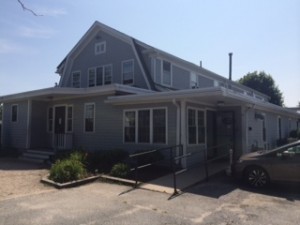
CCB MEDIA PHOTO
NOAH Shelter in Hyannis
A new name and model for a regional homeless shelter was later announced, after the manager of the NOAH homeless shelter said one resident had been living there for 26 years.
Instead of being named after the problem—the acronym NOAH stands for No Other Available Housing—the new center will represent solutions: The Transitional Living Center of Cape Cod.
There is no location for it yet, but the plan is for it to be located outside of the Hyannis business district, preferably in another Cape town.
Numbers of how many homeless people are in the Hyannis area came from the police department, the shelter and a recent homeless census count. All three estimated about 400 people, with the majority of those people saying they are from towns on Cape Cod.
Barnstable Police Chief Paul MacDonald said responding to the calls for service, arrests, and a special unit devoted to handling the homeless costs his department more than $500,000 a year annually.
Rick Presbrey, president and CEO of Housing Assistance Corporation, the agency that runs the NOAH homeless shelter, said HAC wants to work closely with civic and business leaders to solve the problem.
Presbrey, who is also a member of the day center committee, agreed the NOAH shelter needs to be moved. “We don’t like the location or the building,” he said.
The closing of the Long Island Shelter in Boston this past winter had an impact on Cape Cod, MacDonald said, because homeless shelters in the Boston area, like the Pine Street Inn, are referring people down to Cape Cod.
The Long Island Shelter was closed after the bridge leading to the shelter was condemned, displacing about 700 people.
“They had to close the shelter and a lot of the individuals were referred down here to NOAH,” MacDonald said.
A Grisly Murder in Bourne

COURTESY OF CLAUDINE WRIGHTER
Officer Jared MacDonald
Bourne police came under a spray of gunfire in February while responding to a reported disturbance at a condo complex on Roundhouse Road.
One woman was killed and one injured, both United States Coast Guard officers, in the shootings. The suspect, Adrian Thomas Loya, 32, of Virginia was also in the Coast Guard.
Coast Guard Petty Officer Lisa Trubnikova, 31, was killed as a result of being struck by multiple gunshots. She was stationed at Joint Base Cape Cod. Lisa’s spouse, Anna, was also shot and wounded but survived.
Bourne police officer Jared MacDonald was critically wounded after allegedly being shot by Loya while he was responding to the scene. MacDonald was hospitalized for weeks and later returned home to continue his recovery. He had not returned to duty as of late 2015.
The bullet injured his spine, kidney and liver. There were a total of 30 indictments against Loya within the charges stemming from the murder. A possible motive has yet to be made clear by law enforcement.
In August, Loya was deemed competent to stand trial.
A New Era for the Mashpee Wampanoag Tribe
Several years after achieving a hard-fought federal recognition designation by the government, the Mashpee Wampanoag succeeded in the final step that will allow them to build a casino resort in Massachusetts.
The Department of the Interior approved their land-into-trust application for parcels in Taunton and Mashpee, creating sovereign tribal land.

An artist’s rendering of the Mashpee Wampanoag tribe’s proposed $500 million casino in Taunton. The tribe hopes to secure the state’s sole casino license for the Southeast Region. (Photo courtesy of the Mashpee Wampanoag tribe)
Shortly after the approval, tribal and city leaders in Taunton, where the casino will be built, touted the economic benefits of the $500 million plan.
Mayor Thomas Hoye said the city would see at least $8 million annually from casino revenues and have the casino operator subsidize dozens of new police and firefighter jobs, not to mention provide thousands of local jobs in a once bustling manufacturing center.
Tribe officials laid out some of the first work to be undertaken in the spring, including traffic-related improvements around the proposed site, a business and industrial park off Route 140 near the Silver City Galleria Mall.
“It’s quite an undertaking,” said Dave Matton, the tribe’s consultant on the project.
The tribe received federal recognition in 2007 but traces its ancestry to the Indians who first encountered the Pilgrims nearly four centuries ago.
Paula Peters, whose father had been among the tribal leaders who had pushed for federal recognition in the 1970s, said, “This has been a long time coming.”
The deal calls for the state to collect 17 percent of the tribal casino’s gambling revenue. But if the state approves another casino in southeastern Massachusetts, it gets no share of the tribal casino’s revenues.
As of late 2015, the state Gaming Commission was still considering a commercial casino license for Brockton.
The Battle Against Erosion Continued
The never-ending fight against the shifting sands of Cape Cod’s coastline took on new urgency in 2015, as valuable sections of beachfront were gobbled up in winter storms from Sandwich to Provincetown.
The issue appeared most severe in Sandwich, where the battering and breakthroughs at Town Neck Beach threatened some of the town’s infrastructure along Route 6A, including the police and fire stations.
The battle to get dredge spoils from the Cape Cod Canal seemed endless, often threatening the project altogether.
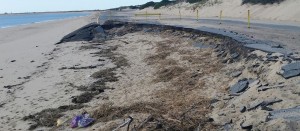
The Herring Cove Beach north parking lot was badly damaged by winter storms
There were failed attempts to get easements from nearby property owners and an eventual town meeting vote to proceed with the project on the public beach only. Then there was an unexpected increase in the cost for the beach re-nourishment which required another town meeting vote.
Late in the year, Sandwich received the final permit needed from the Army Corps of Engineers to start the project, which calls for 150,000 cubic yards of sand dredged from the canal to be placed on the beach on town owned property.
Sandwich Department of Natural Resources Director Mark Galkowski says the dredging was expected to start by the end of December.
“This project will be huge,” Galkowski said. “I know people are very excited about it in town but I don’t think they understand how much material we are talking about. The permitted project will be one of the biggest beach restoration projects in the country.”
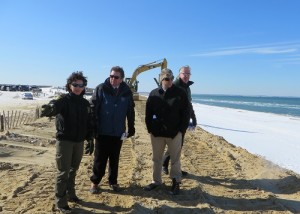
CCB MEDIA FILE PHOTO
Erosion has been severe this winter at north-facing beaches on Cape Cod, including Town Neck Beach in Sandwich. Officials gather at Sandy Neck Beach to see the results of recent storms.
Just east of Town Neck Beach, Barnstable officials fought their own battle with significant erosion on Sandy Neck Beach, where a section of the parking lot hung precariously close to the edge of an eroding bluff.
Sandy Neck Beach Park Ranger Nina Coleman said Winter Storm Neptune on February 14 and 15 continued damage started by Winter Storm Juno from January 26 to 28 on Sandy Neck Beach.
The dunes fronting the parking lot were all but leveled by the storms. Emergency sand nourishment put in place earlier in the year, what Coleman called “sacrificial” sand, was all sacrificed to the sea.
The next step, Coleman said earlier in the year, was installing what is called “soft” engineering technology.
At the Cape Cod National Seashore, erosion took a big chunk out of the Herring Cove Beach parking lot in Provincetown. Large pieces of pavement collapsed in the winter storms. Herring Cove, with its parking lot just steps from the water, is one of the most popular beaches on Cape Cod, especially at sunset.
Repair work was completed in time for the summer tourism season.
“We are pleased to have the north parking lot open and ready for the 4th of July weekend,” said National Seashore Superintendent George Price in late June. “We know that this parking lot is a local favorite for watching the sunset each evening. I appreciate all the extra effort by [National Park Service] contracting staff and the contractors on site to finish the work for our visitors at the start of the busy summer season,” Price added.
Workers had to remove damaged material, before grading and preparing the new pavement.
The repairs are the latest to the parking lot, which has often been damaged by harsh winter storms. A long-term fix that would elevate the lot by 15 feet and move it back 125 feet is currently in the review stage. Price said they should get at least 50 years out of the new parking lot once it’s constructed.
But the repairs were short-lived. A late December storm eroded more sections of the parking lot, again collapsing some of the pavement.
In Eastham, the Nauset Light Beach stairs were destroyed in the winter storms, but replaced before summer.
A School Superintendent Under Fire and Suspended
Mashpee School Superintendent Brian Hyde found himself in a swirling controversy in 2015 that resulted in criminal charges and a paid suspension.
Hyde pleaded not guilty to misdemeanor charges of breaking and entering and trespass after a clerk magistrate found probable cause to move forward with criminal charges against him for entering a student’s home during a residency check in September.
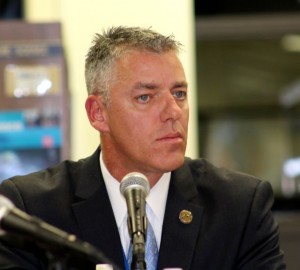
CCB MEDIA PHOTO
Mashpee Superintedent of Schools Brian Hyde
He was released on personal recognizance.
Marilyn King, the mother of the student involved, alleges that Hyde trespassed into their home during his investigation.
Hyde previously issued a statement that the incident on September 29 was a routine residency check to determine whether a student, who had moved out of the district and then returned, was a resident of the town.
But King, who had recently purchased a house on Windsor Way in Mashpee, said Hyde arrived at the home unannounced and entered uninvited to search her daughter’s room.
After the incident, Hyde sent out a prepared statement explaining his side of the story. “Mashpee Public Schools has a student registration practice of completing a home visit to all new or returning students and confirming residency,”
Hyde wrote. “As a result of residency laws, school choice criteria, and regulations addressing the education of homeless students, the registration process for students is more complex and requires greater documentation than in the past.” His case is scheduled to go to trial in January.
The Beginning of the End for a Nuclear Power Plant
The company that owns the Pilgrim Nuclear Power Plant in Plymouth announced in 2015 that they would not seek another re-fueling of the plant, and would close the controversial facility no later than 2019.
The plant had been a bone of contention for decades for many on Cape Cod who worried about its safety and the fact that the Cape was never included in an emergency evacuation zone.
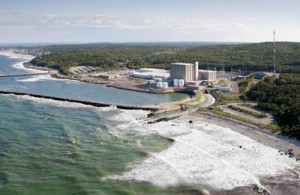
COURTESY: Pilgrim Nuclear Power Plant
Entergy Corporation cited poor market conditions, reduced revenues and increased operational costs in its decision. The 43 year old plant needs millions of dollars in safety improvements.
Without those upgrades, the plant faced a potential shutdown from the federal government.
“The decision to close Pilgrim was incredibly difficult because of the effect on our employees and the communities in which they work and live,” said Leo Denault, Entergy’s chairman and chief executive officer in October.
The news came about a month after federal inspectors said they would increase oversight of the plant in the wake of a shutdown during a winter storm. That move downgraded the plant’s safety rating and put the facility in a category as one of the three worst performing plants in the country, along with two reactors in Arkansas.
The Nuclear Regulatory Commission said that Pilgrim could have prevented the January 27, 2015 problem involving safety relief valves at the plant by identifying, evaluating and correcting a condition that caused one of the valves to fail to operate correctly after a plant shutdown in 2013.
Cape and Islands State Senator Dan Wolf (D-Harwich), a longtime supporter of closing the plant, said he was pleased with Entergy’s decision.
“Now the focus is from when is the plant going to stop operating to how do we responsibly decommission it, following both the financing and safety of that,” he said.
Had the company decided to keep the plant open, Entergy would have been faced with the costs of additional federal safety inspections. An additional 1,500 to 3,000 hours of inspections and oversight as a result of the latest failed inspection and subsequent safety rating downgrade would be required, according to NRC Spokesman Neil Sheehan.
Wolf said there needs to be focus on the spent fuel rods which will still be in place once the plant stops operating. “What has to happen relatively quickly, or as fast as possible, is switching them from a wet storage pool into a dry cast storage, which is much more stable, less vulnerable form of storage.
The plant was re-licensed in 2012 for 20 years.
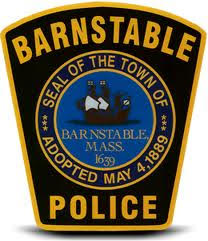 An Unsolved Murder Along Route 6
An Unsolved Murder Along Route 6
State and local police investigated a murder mystery along Route 6 in 2015.
The body of 28 year old Christine Ferreira was found on September 19 in a rest area on the Barnstable/Yarmouth town line.
Ferreira’s body was found in the early morning hours with stabbing wounds and multiple gunshots.
No arrests had been made in connection with her death as of late December.
HONORABLE MENTIONS:
Other stories that caught the attention of Cape Cod readers and listeners in 2015 included the retirement of longtime Massachusetts Maritime Academy Admiral Richard Gurnon, who was replaced by Vice President Tom McDonald, himself a graduate of the MMA.
After decades of being one of Cape Cod’s most popular nightclubs, the aging and tired Pufferbellies Nightclub in Hyannis was sold to make way for a new development.
In mid-December, Hyannis-based Island Airlines abruptly announced its closure and filed for bankruptcy. The sudden move left dozens unemployed and a void in air passenger and freight capacity between Hyannis and Nantucket. Cape Air and Retrix Aviation were expected to fill some of the gaps.
The unique phenomenon of turtle strandings along Cape Cod Bay beaches continued unabated during the early winter, with record numbers rescued and rehabilitated.
An 18-year-old camp counselor was found dead at Camp Burgess in Sandwich in July, but no foul play was suspected.
Cape Cod’s First Barnstable District saw the inauguration of Republican State Representative Tim Whelan, a former U.S. Marine and Massachusetts State Trooper, who won the seat vacated by the retiring Democrat Cleon Turner.

Cape and Islands State Senator Dan Wolf
Cape and Islands State Senator Dan Wolf announced he would not be running for re-election after six years and three terms in office. He attempted a run for governor in 2013 by was sidetracked by a battle with the State Ethics Commission over his ownership of Hyannis-based Cape Air/Nantucket Airlines. Several Democrats and Republicans are expected to run for the open seat.
In other 2015 political news, Democrat Randy Azzato announced a challenge to longtime Republican Barnstable County Sheriff Jim Cummings. Democrat Matt Patrick said he’ll run against Republican Third Barnstable incumbent David Vieira.
Incumbent state representatives Sarah Peake, Tim Whelan, Brian Mannal, Randy Hunt, Tim Madden, Susan Williams-Gifford and State Senator Vinny deMacedo did not have formally announced challengers as of late December.
The 2015 CapeCod.com Year in Review was compiled and edited by News Director Matt Pitta, with story contributions from Matt McCarthy, Brian Merchant, Justin Saunders, Adam Forziati, Laura Reckford, Mike DeFina and Jay Rogers.





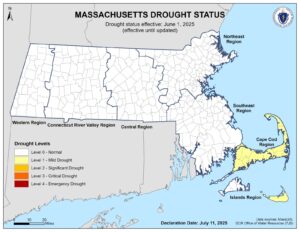
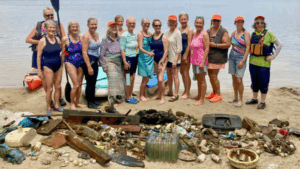
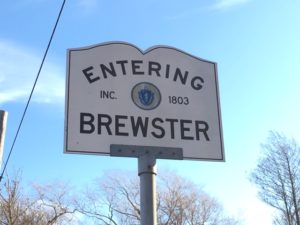


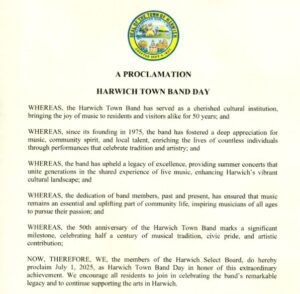
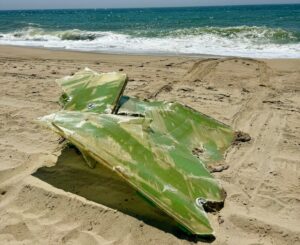












Speak Your Mind